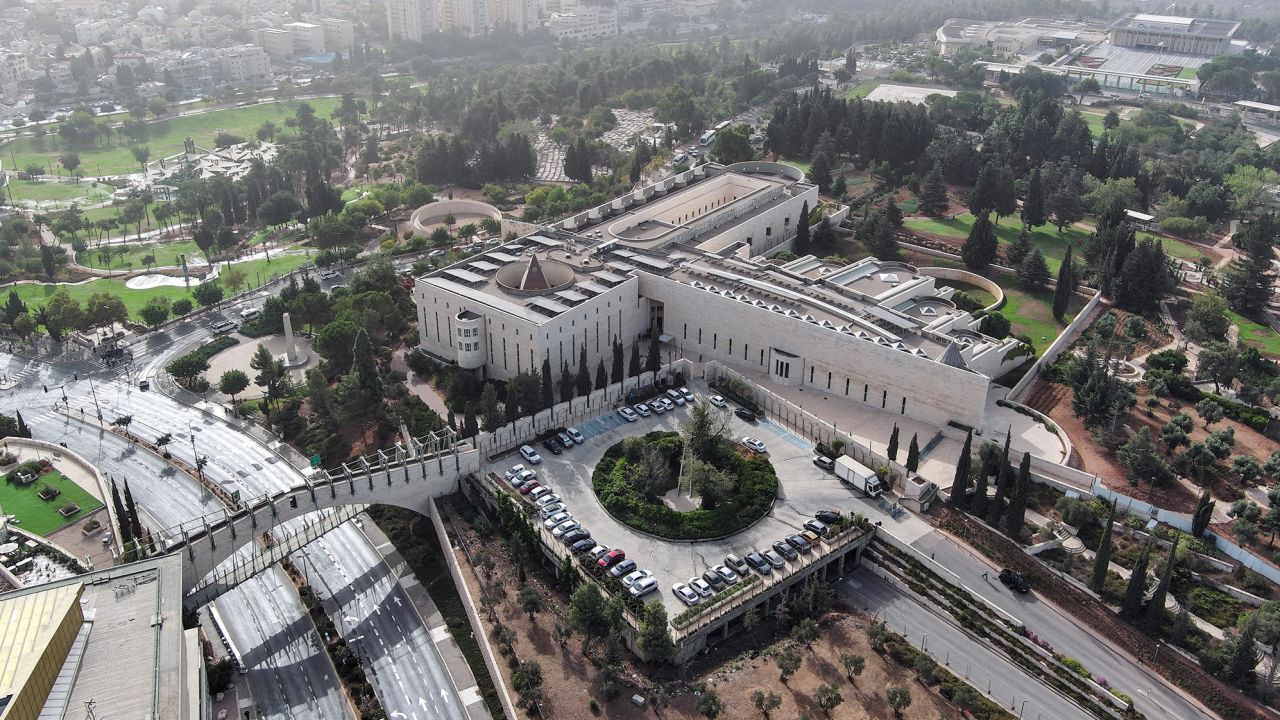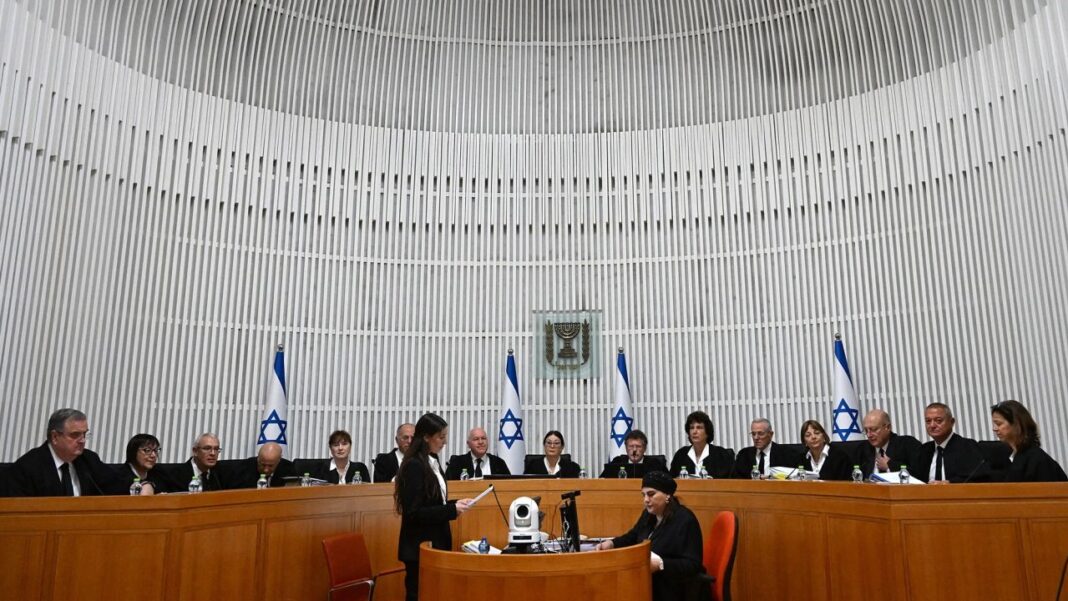The Daily Observer London Desk: Reporter- James Richards
Israel’s Supreme Court held hearings Tuesday on a law to curb its powers, in a case that could set the judiciary on a collision course with Prime Minister Benjamin Netanyahu’s hardline government after months of mass protests over the controversial legislation.
The court heard arguments for and against the first part of Netanyahu’s judicial overhaul plan to pass parliament – a law that restricts the court’s ability to nullify government actions it deems “unreasonable.”
Beyond the legal questions surrounding the law and the justices ruling on their own powers remains the question of whether Netanyahu’s government would even abide by a court ruling – possibly months away if it comes – striking down the law. That would set Israel up for an unprecedented judicial and political crisis.
Netanyahu has always claimed that he is in full control of this government – no matter who his ministers are. But the next few weeks could be critical to his own future.
“If Netanyahu wants to survive as prime minister, he must have his hands on the steering wheel, otherwise he will fall apart,” said Amit Segal, chief political correspondent for Israel’s Channel 12. “The Supreme Court and the government alike possess a credible nuclear threat against the other side … if both sides are rational actors, they will … disarm themselves. Problem is, we’re in a crisis that is not very rational anymore.”
Netanyahu’s proposals to weaken the courts have divided Israeli society, with critics describing them as a threat to the country’s democracy. Tens of thousands of Israelis took to the streets outside of the Supreme Court on Monday evening, part of the 36-week long protest movement against the overhaul, to show support for the justices ahead of the hearing. Some of the demonstrators later marched to the prime minister’s official residence in Jerusalem.
The Supreme Court listened to arguments from 14 lawyers over the course of about 13 and a half hours – including questioning lawyers for the government a second time in the evening session after they first presented their arguments in the morning.
At the conclusion of the hearing, two of the lawyers defending the law asked permission to file further written submissions. The court gave them each 21 days to file submissions not more than 15 pages long.
Perhaps the most memorable moment in the hearing came in the morning session, when Justice Isaac Amit told lawyer Ilan Bombach, representing the Netanyahu government, that “democracy dies in a series of small steps.”
Amit and Bombach were also involved in the exchange that drew the biggest laugh of the day, when Amit told Bombach that he was not worried about “horror scenarios such as the Knesset banning redheads from voting.”
“I am!” piped up redhead Eliad Schraga, the lawyer for the Movement for Quality Government, who was sitting behind Bombach. Everyone in court burst out laughing.
Bombach turned to Schraga and said an individual exception could be legislated for him, prompting more laughter.
During the afternoon session, lawyers for the Attorney General – who believes the reasonableness law should be struck down – and eight plaintiffs argued that stripping the court of the power to declare government decisions unreasonable would weaken Israel’s democracy.
Justices grilled lawyers from both sides rigorously, giving little indication which way they would rule.
Bombach, representing Benjamin Netanyahu’s coalition government, spoke for the longest – nearly twice his allotted time – while some other lawyers were allotted only 10 minutes.
The so-called “reasonableness law” is the first aspect of the judicial overhaul passed in July by Netanyahu’s government despite months of street demonstrations, warnings from the Biden administration and a boycott by all opposition lawmakers of the final vote on the bill.
The measure, which amended one of Israel’s Basic Laws, came into effect two days after it was passed and strips the Supreme Court of the power to strike down government decisions it finds to be unreasonable.
Like the United Kingdom, Israel doesn’t have a written constitution. Instead, it relies on 13 Basic Laws, as well as court ruling precedents that could one day become a constitution. That leaves the Supreme Court as the only check on the executive and legislative branches of government. Striking down a Basic Law would be uncharted territory for the Supreme Court, although it has examined and commented on Basic Laws before.

In 2021, the court outlined very narrow circumstances under which a Basic Law can be annulled. Supreme Court President Esther Hayut said a Basic Law could be struck down if it endangers democratic principles such as those that deal “a mortal blow to free and fair elections, core human rights, the separation of powers, the rule of law and an independent judiciary.”
That standard was then used this year when Netanyahu dismissed key ally Aryeh Deri from all ministerial posts, in compliance with a Supreme Court ruling that it was unreasonable to appoint him to positions in government due to his criminal convictions and because he had said in court last year that he would retire from public life.
In a historic first, all 15 judges on the court have been convened to hear the challenge to the controversial law, which is expected to last no longer than a couple of days. The court must issue its ruling by January 12, 2024, because of a retirement coming up on the bench.
In an interview in July, Prime Minister Netanyahu refused to commit to abiding by a potential Supreme Court decision to strike down the law, which he and his allies say is necessary to rein in an activist judiciary that is not accountable to the will of the people.
The anti-judicial overhaul demonstrations are now the longest and largest protest movement in Israeli history.
It started when Netanyahu took back power late last year – leading the most right-wing and religious coalition ever to hold power.

And though judicial reform was barely, if ever, mentioned during Netanyahu’s election campaign, it quickly became the main issue when Justice Minister Yariv Levin announced the sweeping plans days after being sworn in.
The original proposals included reshaping how Supreme Court justices are selected, taking away some of its powers to nullify government actions, significantly limiting the authority of government legal advisers, and even giving parliament the power in certain cases to overturn Supreme Court rulings with a simple majority.
Netanyahu’s coalition said the changes were necessary to rebalance the branches of government, claiming that the Supreme Court had become insular and elitist, and held too much power over the democratically elected legislators. Opponents saw the reforms as a power grab for the ultra-Orthodox and settler movements and as a way to help Netanyahu as he faces an ongoing corruption case – charges he has vehemently denied.
Although aspects of the reforms have been dropped or softened since their initial rollout, the demonstrations have grown and morphed into a wider protest movement against the government, whose far-right ministers like Bezalel Smotrich and Itamar Ben Gvir have made controversial statements about Israeli society and about Palestinians that have raised concerns from international allies.
Many Israelis, both those for and against the judicial changes, say Israel is risking tearing itself apart, and that the judicial overhaul is just one aspect of what’s really fueling the divide – the battle between secular and religious, settler and not.
“Every single Western democracy experiences an identity crisis in its third or fourth generation. Who are we?… What are we here for? And in Israel? The crisis is whether we are Jewish and democratic state, or a democratic and Jewish state. What is the 51%? And what is the 49%? Is it a strawberry banana yogurt, or a banana strawberry yogurt?” Segal said.
The judicial overhaul and the government’s actions have not only sparked the massive protest movement that has regularly shut down some of Israel’s busiest roads and highways, but it’s also affected everything from Israel’s military, to its economy, and its international relations.
Thousands of military reservists and even some active duty soldiers have vowed not to serve if the judicial overhaul went into effect. Banks and credit ratings agencies warned about the stability of Israel’s business climate as a result of the reforms. Israel’s famous high-tech community has been unanimous in expressing deep concern over the plans, and Israel’s security establishment, including former military generals, chiefs of staff, Ministers of Defense, and chiefs of Israel’s security and intelligence agencies have said such changes would or have already weakened Israel’s security.
Haim Tomer, who served as the Mossad’s chief of intelligence and then its chief of international liaison – meaning he worked with other nations’ spy agencies – until 2014, told that Israel’s security is weakening because the spirit of the armed forces, the feeling of solidarity and “shared values” have taken a hit.
“The pro-Iran camp, Iraq, Lebanon, and other Shiite forces that actually are following what’s going on see it as a kind of opportunity. (Hezbollah leader) Hassan Nasrallah has said it in his own, I would say very clear-cut phrases, he said, ‘I see that the collapse of Israel has already started. We should wait on the sidelines and see how Israel is ruining itself,’” Tomer said. “So they are looking for an opportunity to help us to give us a little push to this collapse.”
Allies, most notably the United States, have expressed deep concern over the overhaul with President Joe Biden urging Netanyahu only to pass such changes under a broad compromise agreement with opposition parties. A meeting between Netanyahu and Biden in the US has been publicly mooted, though has notably not happened yet as a result of the legislation – highly unusual for two countries that claim to be such stalwart allies.
And Tomer said regional and newer allies, like the United Arab Emirates are also expressing concern.
“The need for unity is not only to be strong, vis a vis our enemies,” Tomer said. “But the need for unity is very much requested to keep up the relations or even to develop relationships with our partners in the region.”
There are reports in Israeli media that Netanyahu is considering announcing he’s agreeing to Israeli President Isaac Herzog’s compromise plan on judicial reform. But until legislation is credibly on the table or passed regarding the law the Supreme Court is weighing this week, the hearings will move forward.
Tomer says a move by the court to strike down the legislation could lead to some major dilemmas for Israel’s security leadership.

“It means that there is a question for the chief of police. Who should he – so to speak – obey? (National Security Minister) Ben Gvir that might ask him in two weeks to stop all licenses for demonstrating on the streets, because he’s against that? Or for the Supreme Court that might say we have a right to demonstrate, the right to strike by our so to speak legal system,” Tomer said.
Meanwhile Netanyahu is heading to the US to speak at the United Nations General Assembly next week as a Biden invitation remains unfulfilled, all the while a possible peace accord between Israel and Saudi Arabia is being hammered out, according to reports.
If Netanyahu wants such achievements, he must do so while also balancing the desires of his coalition partners, whom he needs to remain in power. A deal with Saudi Arabia would likely require serious concession to the Palestinians, which may be a step too far for some of his more ultra-nationalist partners.
“(Netanyahu) lacks the power to actually lead this coalition boat to the destination that he seeks, because he is fully dependent on his far-right partners, so Netanyahu that we know, wants to promote the peace accords with Saudi Arabia and to promote the economy. And yes, to have some judicial reform, but not the full monty,” Segal said. “So what I really think is that unless Netanyahu wakes up and tells his tells his partners that they must go to the direction that he wants to, his government is in danger of falling apart.”



